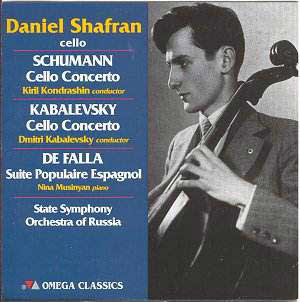Shafran became something of a legendary figure amongst
cellists. He made a fabled child prodigy debut at ten, playing the Rococo
Variations with the Leningrad Philharmonic conducted by Albert Coates.
In later years, though, he toured abroad very seldom – making sporadic
visits in the 1960s to Rome, New York and London and a succession of
visits to Japan where he was immensely popular and had a number of students.
Towards the end of his life he gave two celebrated recitals at Wigmore
Hall.
Omega Classics charts Shafran in the 1950s. He was
29 when he recorded the Kabalevsky - the Schumann, Haydn and de Falla
followed five years later. All these recordings deserve considerable
attention not least for the marked differences between Shafran and his
more famous contemporary Rostropovich. Both had emerged from the shadow
of Sviatoslav Knushevitsky, the Soviet Union’s leading cellist, but
it was Rostropovich whose powerful and multi-faceted magnetism was to
dominate post-War Soviet cello playing. Here however we have the opportunity
to investigate the recordings of a musician of distinctive, sometimes
idiosyncratic, gifts. In the Schumann, which receives a characteristically
involved performance, Shafran leans on notes and can be abrupt and declamatory.
In the first movement he is somewhat rhetorical though his playing of
the high lying passages is impressive and his dramatic oratory may well
appeal garnished as it is with some intensely vibrated passages. From
10’04 on there is some provocatively expressive phrasing which leads
to a slow movement in which he lavishes considerable reserves of tonal
fire. In the finale there are some vertiginous dynamics and eyebrow
raising swoops – the passionate intensity of his bowing and its allied
intricacies can’t be overlooked and nor, in all honesty, can the fact
that this isn’t the cleanest playing you will hear though it is amongst
the least dull. Shafran inserts his own cadenza which is fractious in
the extreme though undeniably exciting. Kondrashin is commendably attentive
throughout.
The rash of Soviet Cello Concertos written approaching
or just after the War’s end included those by Miaskovsky, Khachaturian
and Kabalevsky. The last was written in 1948-9 and is considerably the
superior of the overblown Khachaturian though significantly less impressive
than Miaskovsky’s. Shafran bends his notes with extraordinary conviction
in the imitation of Eastern wind instruments and he is commandingly
assertive. His was not an aristocracy aesthetic of cello playing as
was, say, Fournier’s – Shafran could be, and is here, an impressive
exponent of high tensile playing, intensely rhythmic with the ability
to retard and relax rhythms, which he does to tremendous effect in the
opening movement. His engagingly sly slowing down at the movement’s
charming conclusion is expertly judged. In the second movement we can
hear some indistinct sound in the orchestra – the recording is occasionally
rather muddily diffuse – especially in the lower strings. The orchestral
exchanges are robust, Shafran’s playing prayerful and leanly expressive
– I only wish the orchestral weren’t so withdrawn in the balance. The
freely repeated but varied dance of the finale is distinctly pleasurable
listening, with filigree solo work, whip cracks and folk-like winds
leading to a fireworks conclusion negotiated with excellence by Shafran
and orchestra alike. The remainder of the programme sees the cellist
partnered by Nina Musinyan. At the start of the Piatigorsky arranged
Haydn Shafran makes a very slow downward portamento but elsewhere he
uses his lean and fast vibrato to good and well varied effect. He fines
down his tone, shading the vibrato with differing colours and speeds
as the Adagio develops. We can hear his big, booming lower strings in
the Minuet and Trio and some energetic work on the upper strings as
well and in the concluding movement we can hear real engagement and
some very quick and naughty portamentos. Maurice Marechal, one of the
greatest of all cellists, arranged the de Falla Suite Populaire Espagnole
and lucky left us a recording of some movements from it. Shafran is
inward and withdrawn in Nana, yearning and keening in Cancion
but with a sharp edged quality, his upper strings contrasting with
the deliberately rougher tone he elsewhere employs. He is fiery and
passionate in Polo and in Asturiana we can appreciate
another facet of Shafran’s art – his considered variance of expressive
devices, where quickly expressive portamentos are not repeated in the
same theme. I enjoyed Musinyan’s pianism in Jota and theirs is
a cohesive partnership but maybe Shafran is a little discursive in the
slow sections, too much disparity thus emerging when he lurches into
the faster ones. Comparison with Marechal shows, not unexpectedly, that
the French cellist, recorded many years earlier in 1929 is tighter,
tauter, less fervid tonally, less elastic, less romanticised. The Ritual
Fire Dance is a propulsive and fiery way to end this most rewarding
recital. There’s no chance of Shafran floating a mellow covered tone
here – it is raw and alive with excited and expressive musicianship.
And entirely consonant with the rest of this varied and well documented
disc.
Jonathan Woolf


